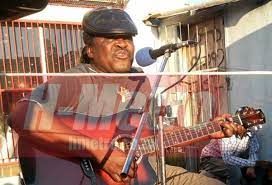
Steve Makoni
Brought To You By ZimLegends
Dhongi is a distortion by the Shona speaking people that refers to an animal called donkey. The dictionary definition of a donkey is a domesticated hoofed mammal of the horse family with long ears and a braying call, used as a beast of burden; an ass.
It is not an honour to be nicknamed Dhongi (donkey), as the word is often used as an insult referring to a stupid or incompetent person. Yet, that is the name that well-known musician and comedian, Steve Makoni, earned himself for his Sabhuku Nedhongi comical hit.
Sabhuku Nedhongi is the tale of a village head whose donkey disappears with a bag of maize meal on its back, when the donkey was on its usual assignment of ferrying the luggage to and from the grinding mill. Steve Dhongi Makoni, in his song poses paradoxical questions about the disappearance of the donkey and the mealie meal.
What Steve Makoni’s fans have not interrogated is the inner message behind the funny story: Was he trying to highlight the abuse the beast of burden by villagers in his motherland, or was he just narrating the funny tale that he picked from elders in the village?
For revellers enjoying a drink in a bar, such entertainment creates the perfect atmosphere, away from the hustling and bustling of trying to earn a living. It is no wonder that a lot of Makoni’s performances have been facilitated by Delta Beverages, the leading producer of alcoholic and non-alcoholic drinks in Zimbabwe.
Makoni’s incessant bar performances at one time affected his plans to record an album in a collaboration with Oliver Mutukudzi. Asked about progress on the Munyimbo album project in 2013 Makoni said, “It was becoming increasingly difficult to travel to Harare from my base in Rusape due to many engagements at private functions, some of which were organised by Delta Beverages.”
Born in the early 1950’s in Nyanga, Steve Makoni is from the royal family of the Nyati (Buffalo) totem, a dominant clan in the eastern region of Zimbabwe.The Makoni chieftainship is famed for bravery of their great, grandfather chief Chingaira who was executed by the colonial settlers for strongly opposing British South Africa Company rule.
Steve Makoni rose to fame in the 1990’s from being a mere solo guitarists to a well-known and powerful musician when he penned and sang the pro-woman-empowerment song, Handiende (I will not leave). This is a song about a womanstressing to her husband that she will never leave her matrimonial home despite her irreconcilable differences with him. She would instead stay on to protect her children. It’s a song that resonates with the view of most married women who may find themselves in a situation that Makoni describes in the song.
The “arrogance” of the defiant woman is amply portrayed by the gory tone that Steve assumes each time he emphatically repeats the message Handiende (I will not go)the song rejuvenates women who would have been on the verge of giving up on their marriages.
Dhongi further demonstrated his understanding of the art of deceit in marriages when in 1994 he released the album Risati Ravira(Before sunset) with the hit song Zvatsonyana.
This is a hypothetical situation where a recently widowed woman who always pretended to be deeply in love with her now deceased husband is eyeballing another man before sunset on the very day the husband is buried. The same woman had always told her husband that she loved him so much that she is unable to eat or sleep in his absence. The husband who, apparently, had never been convinced of the exaggerated flattering utterances by his “sweetheart” unfortunately dies leaving the woman to enjoy her long established adulterous affair. Such is the comical approach to serious issues that has earned the solo guitarist Dhongi the popularity that he enjoys.
His song Mambo Haagadzwe ne Mutorwa received a lot of airplay in an apparent move to politicise its lyrics that suggested strangers cannot crown a king in the presence of his relatives. Through this song Makoni was the third highest earner of music royalties from Zimbabwe Music Rights Association (Zimura) in 2013.
Among the highlights of Makoni’s career was his trip to the United Kingdom in April 2016, where he performed alongside Chimurenga music guru, Thomas Mapfumo, and Raymond Majongwe at a show dubbed Zimbabwe Independence Chimurenga Bira Festival at Corah Suite, Euro House in Leicester.
One of Makoni’s comic drama scenes is narrated by Professor Fred Zindi which he witnessed in 1990, at Skyline Hotel in Harare. The Prof says;“I attended a concert by the Run Family Band which had come from Mutare and had released a song called Hatichina Wekutamba Naye (We no longer have a friend to play with). This was a song about Mozambique’s first president, Samora Machel who died tragically in a plane crash along the South African border in 1986. As Peter Mparutsa was on stage singing that song, Makoni went onto the stage, grabbed the microphone from Mparutsa and screamed, “Tibvire apa. Ndiwe ani anoimba Hatichina Wekutamba Naye. Une zera Na Samora Machel iwe? Unotamba naye pakudii?” (Get away, Peter! Why do you sing “we are left with no friend to play with”? Are you of the same age as Samora Machel? How dare you want to play with someone much older than you?)
The crowd, which was in a sombre mood as the song progressed, suddenly burst into laughter. Makoni felt triumphant after his comic act and the crowd applauded him. That is Makoni for you.
Like other leading Zimbabwean musicians such as Thomas Mapfumo, Tongai Moyo, Oliver Mutukudzi who sing in praise of their tribes, Steve Makoni penned the Song Zvaitwa Nyati in praise of his own Waera Shonga of the Buffalo totem, a befitting tribute, ideal for ending his shows thanking himself and his ancestors.